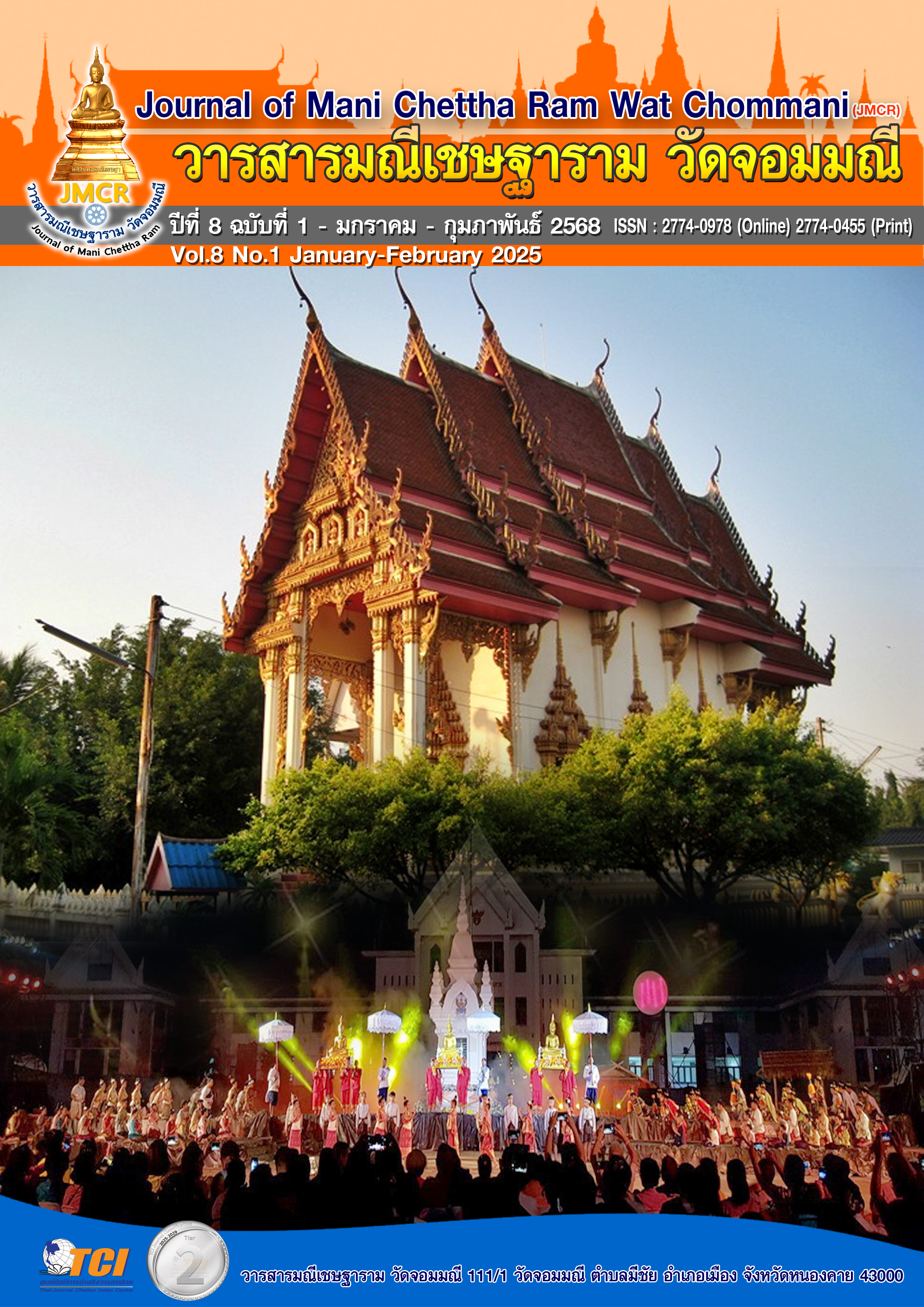PARTICIPATORY MANAGEMENT MODEL TO DEVELOP VACATIONL SKILLS OF STUDENTS WITH INTELLECTUAL DISABILITIES UNDER THE OFFICE OF SPECIAL EDUCATION ADMINISTRATION ACCORDING TO THE PRINCIPLES OF KALYÄNAMITTADHAMMA 7
Keywords:
Participatory Management, Vocational Skills, Students With Intellectual DisabilitiesAbstract
This research aimed to 1) study the status and development guidelines of the participatory management model, 2) create a participatory management model, and 3) evaluate the participatory management model for developing vocational skills of students with intellectual disabilities under the Office of Special Education Administration based on the 7 Kalinamai principles. This research was divided into 3 phases. The informants were administrators, deputy directors of academic affairs, and teachers in the vocational skills group. A total of 120 informants were selected and interviewed, consisting of 5 school administrators with good practices using purposive selection. Phase 2 was a group discussion to develop a participatory management model with nine experts. The tools used were group discussion records and content analysis. Phase 3 was an evaluation of the participatory management model. The key informants were 15 school administrators with intellectual disabilities under the Office of Special Education Administration using purposive selection. The tools used were a model appropriateness assessment form. The statistics used were percentage, mean, and standard deviation.
The research results found that:
- Results of the study of the conditions and guidelines for developing a participatory management model to develop vocational skills for students with intellectual disabilities under the Office of Special Education Administration consist of 3 components: 1) Component 1: Input, consisting of 5 2) Component 2: Process, consisting of 4 and 3) Component 3: Output, consisting of 4
- Results of creating a participatory management model to develop vocational skills for students with intellectual disabilities under the Office of Special Education Administration according to the principles of Kalyanamitra Dhamma 7 consist of 4 components: Component 1: Input, composed of 5 sub-issues, Component 2: Process, consisting of 4 sub-issues, Component 3: Output, consisting of 4 sub-issues and Component 4: Conditions for Success, composed of 2 sub-issues
- Results of the evaluation of the participatory management model to develop vocational skills for students with intellectual disabilities under the Office of Special Education Administration according to the principles of Kalyanamitra Dhamma 7, 4 important components, which are the correctness of the model, the appropriateness of the model, the feasibility of implementation and the ability to be utilized the results of the evaluation are at the highest level in all aspects.
References
กุลยา ก่อสุวรรณ. (2553). การสอนเด็กที่มีความบกพร่องระดับเล็กน้อย. กรุงเทพมหานคร: สหมิตรพรินติ้ง แอนด์พับลิชชิ่ง.
ภาวิดา ธาราศรีสุทธิ, และวิบูลย์ โตวณะบุตร. (2542). หลักและทฤษฎีการบริหารการศึกษา. กรุงเทพมหานคร: สำนักพิมพ์มหาวิทยาลัยรามคำแหง.
วิจารณ์ พานิช. (2555). วิถีสร้างการเรียนรู้เพื่อศิษย์ในศตวรรษที่ 21. กรุงเทพมหานคร : มูลนิธิสดศรี-สฤษดิ์วงศ์.
ศฤงคาร ใจปันทา. (2563). รูปแบบการบริหารแบบมีส่วนร่วมเพื่อส่งเสริมการมีงานทำ สำหรับนักเรียนที่มีความบกพร่องทางสติปัญญา สังกัดสำนักบริหารงานการศึกษาพิเศษ. ใน วิทยานิพนธ์ปริญญาการศึกษาดุษฎีบัณฑิต สาขาวิชาการบริหารการศึกษา. พิษณุโลก: มหาวิทยาลัยนเรศวร.
สุวิทย์ เมษินทรีย์. (2560). พลเมืองที่ตื่นรู้: ฐานรากที่แท้จริงของระบอบประชาธิปไตย. เรียกใช้เมื่อ 15 มกราคม 2563 จาก https://www.facebook.com/drsuvitpage/posts.
สำนักงานคณะกรรมการการศึกษาขั้นพื้นฐาน. (2552). หลักสูตรแกนกลางการศึกษาขั้นพื้นฐาน พุทธศักราช 2551. กรุงเทพมหานคร: ครุสภาลาดพร้าว.
สำนักบริหารงานการศึกษาพิเศษ. (2551). การช่วยเหลือระยะแรกเริ่มเด็กพิการโดยผู้ปกครอง Early Intervention for Children with Disability by Parents and Communities. กรุงเทพมหานคร: สำนักงานพระพุทธศาสนาแห่งชาติ.
อัมพร พินะสา. (2561). การพัฒนารูปแบบการจัดการศึกษาโดยใช้ท้องถิ่นเป็นฐานของสถานศึกษาในสำนักงานเขตพื้นที่การศึกษาประถมศึกษาในภาคตะวันออกเฉียงเหนือ. ใน ปริญญานิพนธ์ดุษฎีบัณฑิต สาขาวิชาการบริหารการศึกษา มหาวิทยาลัยราชภัฏอุดรธานี.
Bardo, J. W. & Hartman, J .J. (1982). Urban society : A systemic introduction. New York: peacock.




